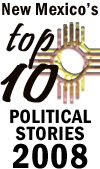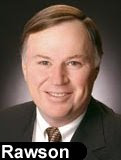It was a year of almost unfathomable change in New Mexico’s political landscape. Giants retired, lost elections or left the state. A new crop of elected officials will be in charge come January. The economy tanked, and its effects colored the election. In all, the theme that ties it all together is change.
Voters are demanding change. They’re tired of the Republican president and the messes he’s left. They’re tired of politics as usual. They’re tired of corruption. They’re tired of feeling like they don’t have a voice. And they’re tired of seeing government benefit the wealthy while their finances get tighter and tighter.
Will the results of the 2008 election bring the change voters want? Ask me again at the end of 2009. In the meantime, here are my picks for the top stories of 2008:
10. NMSU turnover
Departures characterized 2008 at New Mexico State University, and new leadership will characterize 2009. The shift began with the departure of President Michael Martin in August, who left to take another job. Then, earlier this month, NMSU fired football coach Hal Mumme after another disappointing season.
Politically, the most interesting turnover came last month, when Gov. Bill Richardson opted to replace three of five members of the school’s governing Board of Regents. The move came less than a week after the regents suspended their search for a new president after spending some $90,000 on it. One of the regents who Richardson replaced, Bob Gallagher, complained that a state law requiring the regents to publicly name five finalists was unfair and hampered the process. Later, Gallagher and others alleged that public displays of support for Interim President Waded Cruzado by some at NMSU, though she was not a candidate for the permanent job, discouraged some of the would-be finalists for the president position.
The controversy didn’t end there. Gallagher, the outgoing chairman of the regents, also unloaded on Richardson in an e-mail to members of the New Mexico Oil and Gas Association, of which he is president, alleging that Richardson informed him during a profanity-laced meeting in November that he would not reappoint him to the board.
Gallagher alleged that Richardson replaced him as retribution for Gallagher’s negative comments about the business climate in New Mexico. Richardson’s office said that’s not true and that the governor replaced Gallagher in part because he was disappointed with the failed presidential search, not because of Gallagher’s comments about the state’s business climate.
9. Rawson, Foley lose
It isn’t often that incumbents lose. It is even less common that incumbent lawmakers elected to leadership positions are taken out by their constituents. So the fact that the state House and Senate minority whips both lost this year is a huge blow to the Republican Party.
In the House, Dan Foley of Roswell lost in the June primary to Dennis Kintigh after Roswell oilman Mike Murphy spent hundreds of thousands of dollars — an almost unheard of sum in a state legislative race — to get rid of Foley, who was also plagued by a June arrest on misdemeanor charges that were later dropped. He will leave office at the end of the year having served since 1999.
And in the Senate, Leonard Lee Rawson of Las Cruces, who has served since 1987, was hammered for using $111,000 in capital outlay money to pave a road outside his district that provided access to one of his businesses. That, combined with the economy, the local move to change growth policies and the Barack Obama tidal wave added up to Democrat Steve Fischmann narrowly defeating Rawson.
Foley was the glue that held together the Republican caucus in the House and made it able to effectively work with some Democrats to outmaneuver the speaker on key issues. And Rawson, a tireless worker who had one of the best attendance records in the Legislature, was part of the bipartisan coalition in the Senate that became the only real check on the governor’s power in Santa Fe. It’s difficult to believe either GOP caucus will be as effective when the Legislature convenes in January.
8. Aragon’s conviction
The 2008 election overshadowed an October admission from former Senate President Pro Tem Manny Aragon that he had abused his position to steal millions of taxpayer dollars in the Bernalillo County Metro Courthouse scandal.
The conviction was huge news. One of the most storied and powerful politicos in the history of the state admitted to being a criminal. And opponents of ethics reform in the Legislature who had argued for years that their branch of government had no ethical problems suddenly lost that argument.
But what does anyone expect from this? What were once shouts for ethics reform backed by the governor and other top politicians are now barely whispers. A governor who has demonstrated a keen knack for getting most of what he wants approved by the Legislature has somehow been unable to get significant ethics reform passed.
Support for ethics reform may increase with the progressive shift in the Legislature, but there remain very entrenched powers who will fight it.
7. Congressional delegation goes true blue
It’s telling that, come January, Harry Teague will be the most conservative member of New Mexico’s congressional delegation in Washington.
A delegation that presently has three Republicans and two Democrats is about to become true blue, meaning all five members will be Democrats when three new House members take office in a couple of weeks and Tom Udall moves from the House to the Senate.
Teague, an oilman from Hobbs, is a moderate on energy and health care, says he’s a conservative when it comes to guns, and has a demeanor and drawl that feels familiar in the conservative 2nd Congressional District. But have no doubt that he’s a Democrat — one who is close to Richardson and soon-to-be Gov. Diane Denish — and he’s going to fight in Congress for at least most of the issues on the Democratic agenda.
The loss of seniority by the New Mexico delegation is stunning, and its effects will certainly be felt in a state that’s used to pork coming home from Washington. With the possibility that Sen. Jeff Bingaman could retire in four years, the delegation might lose even more. New Mexico’s delegation has long been influential in Washington, so these new members have big shoes to fill.
Can they do it? Time will tell.
6. The GOP gets pummeled
It was a complete and utter shellacking for Republicans on every level. They lost the presidency. They lost every seat in Congress from New Mexico that they held, going from a 3-2 majority in the delegation to nothing. Nada. Zilch.
Which is about what it boils down to on the statewide level. The GOP lost several state legislative seats, including those held by the House and Senate minority whips. Perhaps most striking was the loss by Justine Fox-Young of Albuquerque, a moderate Republican who supported domestic partner benefits. As reported by the New Mexico Independent, she lost by about 100 votes to a Democrat who did little to campaign and whose name wasn’t known to most political watchers, including, admittedly, me.
In Doña Ana County, the collapse of the GOP is all but complete. When the new officials take office in January, there will be only three Republican elected officials in the entire county — the district attorney, sheriff, and one Las Cruces municipal judge. A few years ago, the GOP held several legislative seats, two county commission seats and other offices.
But the pendulum always shifts. Republicans everywhere are talking about how to rebuild. Somewhere, some group of conservatives are sitting around drinking beer or coffee and coming up with the idea that will spawn a new movement. At least, that’s what has to happen if the GOP is going to survive. If it doesn’t, perhaps it’s time for one party to die and another to take its place.
5. The tanking economy
Though the effects of the near-collapse of America’s economy weren’t felt as severely in New Mexico as they were elsewhere, it was still apparent here and was one of the biggest factors in the 2008 election.
This is a story that’s only going to get bigger. Analysts expect the economy to get worse in 2009. And the New Mexico Legislature, governor, and soon-to-be governor are going to have to figure out how to cut what’s currently estimated to be nearly $1 billion from the state budget of about $6 billion when lawmakers convene in January. It’s going to be a painful and monumental task.
By law, the budget must be balanced. And it won’t happen without cutting services or jobs. We’re in one of the most economically difficult times in our nation’s history, which makes this a moment future generations will study.
4. Presidential race
Presidential candidates duked it out over New Mexico this year like never before. During the general election, there were several visits by Obama and John McCain and numerous trips from other surrogates, including their running mates.
Both presidential candidates treated New Mexico like one of the most hotly contested swing states in the nation, so perhaps it came as a surprise to them that Obama won the state by 15 percentage points. The ease of Obama’s victory might knock New Mexico out of the swing-state category the next time around and ensure we don’t see attention like we did this year again for some time.
Obama gambled on a strategy that has rarely, if ever, worked in American politics: He spoke directly to the disenfranchised, the youth, the independents. He called for them to get involved and they did. That’s what made his victory so overwhelming.
Obama had an unprecedented ground organization in New Mexico that included almost 40 offices around the state. His victory was especially crushing in the moderate Albuquerque, where he easily won and propelled other Democrats to unlikely victories.
Obama takes office at one of the more uncertain times in our nation’s history and has made big promises to fix things. For the sake of all of us, here’s to hoping he’s successful.
3. Richardson leaves
It wasn’t really a surprise to anyone, but the effects of Richardson’s departure from the state are going to be widespread. While we can already see the end of the dominoes set in motion by the retirement of Sen. Pete Domenici, the Richardson dominoes have only begun falling. (Of course, this is all assuming the U.S. Senate actually confirms him for the job of commerce secretary in the Obama administration.)
For starters, the lieutenant governor, Denish, will become governor. Then, who will she appoint? If it’s state Auditor Hector Balderas, as many hope, Denish will get to appoint another politico to replace him, and two statewide elected officials would owe their jobs to the first woman to be governor in the state’s history.
Then there is the question of who will join Denish’s cabinet and administration.
As for his legacy, Richardson just happened to govern during an upswing in the oil and gas industry, so he had a lot of money to spend. And spend it he did, on trains and spaceports and new roads and new employees and all sorts of other expansions of state government.
But those years are over, and it’s now time to cut back. It’s unclear whether Richardson will be around to help address the financial crisis, but it’s quite possible that some of what he created is about to be dismantled.
As the man who is probably the most influential and skilled politician in the state’s history rides off into the sunset having won more battles than he lost, and having repeatedly dodged allegations of pay-to-play politics, one thing lingers — an ongoing probe into dealings between the state and a California company that was paid almost $1.5 million for work related to a contract it won around the same time it donated $100,000 to political action committees formed by Richardson.
Will it matter? Or is Richardson really made of Teflon?
2. The Domenici dominoes
Domenici’s retirement was my top story in 2007. At the time, we knew his departure from the Senate would reshape New Mexico politics, but it was too early to know how. Now that the 2008 election is over, we can see the vast changes in the landscape that have resulted.
We have an entirely new delegation in the U.S. House, because all three vacated their seats to run for Domenici’s. We have a new Public Regulation Commission member, Albuquerque city councilor, state senator from Albuquerque and Doña Ana County commissioner because elected officials vacated those seats to run for the open U.S. House seats.
New Mexico’s loss of seniority in Washington is huge and will be felt. The state lost two members of appropriations committees, among other things.
Perhaps equally important is that Domenici’s retirement leaves the state GOP rudderless at a time when it needs to rebuild. Who will step up? Time will tell. I guess the Domenici dominoes aren’t quite finished falling.
1. The progressive shift
There were so many monumental stories in New Mexico in 2008 — Domenici’s retirement, Richardson’s departure and Obama’s victory are at the top of the list — but the end result of all of them is one simple truth: New Mexico is shifting toward a more progressive future.
Obama led the progressive charge across the nation and in New Mexico. Richardson will be replaced by the more progressive Denish. Domenici’s retirement resulted in New Mexico’s congressional delegation becoming much more progressive. And the state legislature has shifted as well, as several conservative Democrats and Republicans were defeated by progressive challengers in the primary and general elections.
Because the GOP lacks significant influence, the economy will have to serve as the check on the power of progressives, who have set forth an ambitious agenda that includes universal health care, alternative energy, domestic partner benefits and ethics reform. Spending for new programs is going to be hard to come by, and progressives are going to be challenged to find ways to enact their agenda on the cheap.
But expect it to happen. The voters have mandated a progressive shift. In the end, that’s how our society works. The pendulum has swung.
On to 2009.








